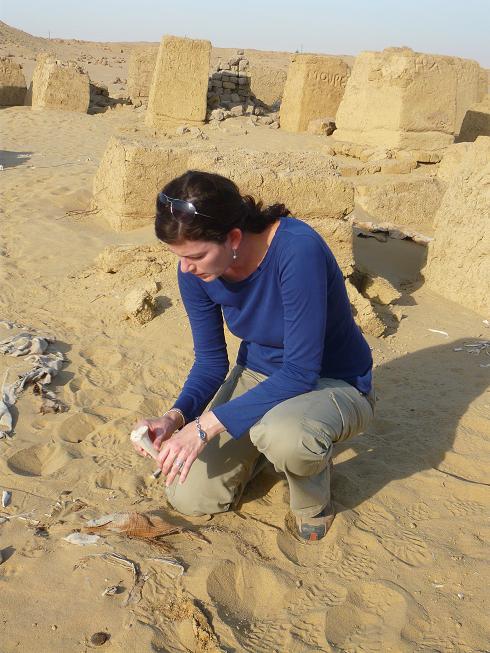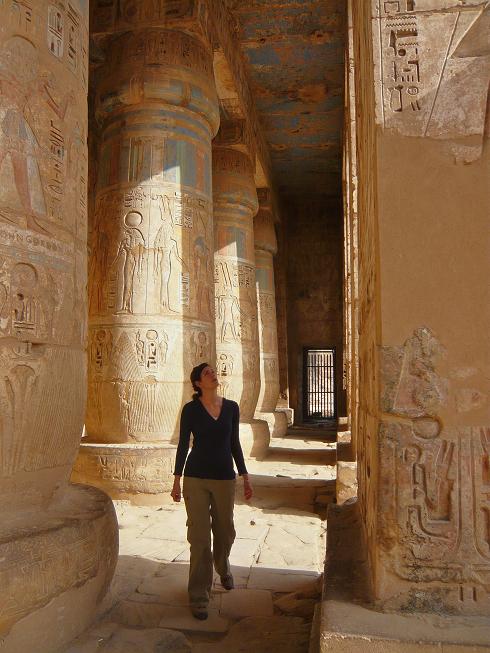Vanya Nikolaeva
Related to the article The Lost Queen of Egypt
Dr. Kara Cooney‘s professional life is devoted to archaeology and Egypt’s history and art. Her first book, The Cost of Death: The Social and Economic Value of Ancient Egyptian Funerary Art in the Ramesside Period was published in 2007. She is working on a number of articles, as well as archaeology series on the Discovery Channel.
Why did you become an Egyptologist?
It was a calling! It just seemed the most natural and right path, like it was what I was meant to do. And I’m one of the lucky ones to have a paying job.
The discovery of Hatshepsut’s mummy is known as the most important find in Egyptian history. Which unsolved mystery of ancient Egypt do you hope to be revealed now and why?
I’m not sure if the discovery of Hatshepsut’s mummy is the most important find in Egyptian history, but it has certainly kindled the public’s interest in ancient Egypt. Human beings like to connect with the physical remains of the dead, particularly the bodies of the powerful and wealthy. And to be able to connect a particular ancient mummy with a specific time in history is very intriguing for us.
We feel like we can touch the past, in a way. And I can only hope that we identify more of the mummies of dead kings. To find Akhenaten, and to be able to prove that a particular body was his, that would be an incredible thing. And it might solve a great many mysteries about what might have happened at his burial, how he was mummified, if his body was treated with respect, etc.
Why, in your opinion, was Hatshepsut so reviled and the historical records embellished or altered?
I don’t think that Thutmose III hated Hatshepsut. I don’t think he reviled her. There’s no evidence for that, and it’s so easy for us to inject human emotion into these historical situations. We know that he removed her images from temple spaces, inserting the names and images of his father Thutmose II and his grandfather Thutmose I instead.
But we also now know, from recent French IFAO excavations, that he waited to perform these actions, perhaps as long as twenty years. I think that he removed Hatshepsut’s images to clear the succession for his own son, Amenhotep II, born of a lesser wife and not of the pure 18th Dynasty bloodline.
Hatshepsut’s bloodline was connected to the earliest 18th Dynasty kings, and this was a possible problem for Thutmose III when he was legitimizing his own son. Maybe there were elite factions arguing that another royal child ascend to the throne. To take Hatshepsut out of the picture made things easier for the succession of his son, because there was a clear line of succession from Thutmose I to Thutmose II to Thutmose III and then to Amenhotep II.
The removal of Hatshepsut from temple inscriptions was politically motivated. And keep in mind that Hatshepsut’s name is preserved in the historical archives as far down as Manetho, so the Egyptians didn’t remove her from the historical inscriptions, only from sacred temple texts and images.
What does ancient history offer to the present? And what keeps people interested in what has happened centuries/millenniums ago?
We are always trying to connect with the ancient past. I know that this is a driving force in my own life. And the reasons for this are very complicated and obscure to me. Some people are looking for origins. Some people love imagining themselves in the past, and I think that many of us long to be in another time. Other people are trying to find justification for a particular belief or even political reality.
Some people are profoundly interested in the mysteries that the ancient world provides. But really, I think we are most interested in the ancient past when we realize that they were human beings just like us, with the same emotions and flaws and motivations. In the end, we human beings are very interested in ourselves.
Which are the most significant facts / moments of ancient Egypt that everyone should know about?
This is a huge question… But if I was pressed, the most important thing about ancient Egypt is its incredible continuity – in language, in religion, and in political systems. For over 3000 years, this culture maintained and nurtured a complicated system of divine kingship, a complex understanding of magical language, and a pantheon of gods, ever changing and yet always staying the same in its basic structure.
As an American, living in a culture where a house is considered ancient if it is 100 years old and where we tear down anything old in favor of the new, this conservativism, kept alive by constant innovation and flexibility, is astounding.
Your dream is…
Well, I’ve already got that. I’m a practicing Egyptologist. Life has already given me everything I’ve wanted and more.














14 comments so far ↓
Nobody has commented yet. Be the first!
Comment